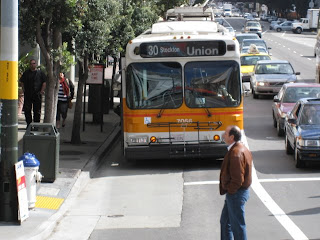 I guess I should make it official: Muni equals City.
I guess I should make it official: Muni equals City. There are many SF points to be scored when choosing the San Francisco Municipal Railway. You get to learn the streets (+1). It’s green (+1). Locals use it (+1). You encounter homeless people, which can always be an interesting experience (+1). Those homeless people smell like urine (-2).
Muni gets me where I need to go and NextBus is extremely helpful (unless it bears the bad news that I’ll have to wait 30 minutes for the next 28 bus). Reliability can be an issue. In that way, it has the power to be convenient while also being super inconvenient. It’s a love/hate kind of thing.
This oh-so-city feature, combined with my “net neutrality” topic, got me thinking about how the two can be related. Based on the fact that San Franciscans are smitten by public transportation and the Internet (just imagine the explosion when combining the two), I have decided to unite the two in a giant analogy that can explain part of the network neutrality situation.
First, the net neutrality idea is based on the belief that networks should not restrict the communication of users based on what they use the Internet for and how much “space” they use. People should receive the same broadband service for the same price whether they’re just checking e-mails or running a highly visited website. For the progression of the Internet, the providers (phone and cable companies) shouldn’t charge more for businesses that use/do more, even if customers are receiving a better service. That makes it harder for emerging companies, like Google and Yahoo! once were, to compete on the same level. Imagine if those two were discouraged from developing because of elevated fees. Instead, that higher quality service should be available to everyone at the same price.
Back to the road. The 28 is moseying along 19th Ave., transporting its precious human cargo. Out the window, I can see the super-28-line zoom past. Why is that fair? It can be argued that the people on the bus paid more to get that faster service. That means that those riders are easily accessible because of the super-line—consumers can meet with them (or they can meet producers) sooner and more often. If they wanted my services, it’d take a bit longer because I’m on the slower vehicle. There’s a definite advantage, which isn’t very fair and can deter those with creative ideas but not enough bankroll.

The best-case scenario for everyone not named Muni/Verizon/Comcast would be to make every bus a super bus with regular transportation prices. Or in the case of actual Muni, I’d be alright with a personal grooming regulation.
[Note: With the MLB playoffs underway, I can’t go against my team (-1).]



2 comments:
Public transportation is definitely an adventure. Fortunately, I never had to use it until I moved to Chico. I'm sure its a whole different experience in the City though. Kudos for you for successfully making the more from the Dale-Desert to the city. My time is coming soon.
making the move*
Post a Comment